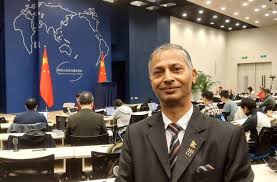
By Rabi Raj Thapa
Sushila Karki’s government is just busy begging the old party leaders to have a common consensus to participate in the forthcoming election. Nepal Government is still far behind in assessing the security situation and making proper planning and arrangement for the safety and security of 19 million voters to come out, walk the whole day in cold winter just to vote for somebody who may be the same old rotten foxy candidate. The government still has not been able to assess the zeal and interest of the security organizations and especially their lower ranks who will be playing a crucial role in the success or failure of the forthcoming election. In security terminology, this attribute is called morale, which may be beyond apprehension for many observers who just throw their guess-estimation as pastimes. Truly speaking, a large number of police personnel from both Nepal Police and Armed Police Force are still struggling hard to come out of that traumatic experience of September 9 that the general people had experienced and felt on September 8 this year.
However, it is just novice-like and amateurish to judge high or low morale of security personnel on an ad-hoc basis. How can the morale of a police officer be high when his minister and prime minister shun their responsibilities to protect both the people and police on duty? It would be a folly and criminal act to imagine police personnel fired without the knowledge and approval of not only their superiors in uniform but also the secretaries, honorable and right-honorable of the government as a whole. It is shameful for the incumbent home minister Ramesh Lekhak and the prime minister Oli to give a statement that they didn’t give any order to police to fire on Gen-Z protestors on the fateful day of September 8. It was equally rash and irresponsible to stop security personnel from protecting their office premises, their weapons, and defending themselves personally. As a result, many criminal elements took full advantage of those security lapses and attacked 123 Nepal Police units, vandalizing all except five main police offices: i.e. Nepal Police Headquarters, Nepal Police Academy, and three District Police Offices of Kathmandu, Lalitpur and Bhaktapur. The government and especially Nepal Police must thank the people of Balambu and Maligaon who came forward to save and protect their local police offices and its personnel to safety.
Today, Nepal Government will not be able to hold the election successfully without addressing the dire needs and grievances of both Nepal Police and Armed Police, and upgrading and developing its intelligence department that has been sickened by extreme politicization of the agency.
Security organizations are not political entities that make and break coalitions to win elections. The government oversight bodies of respective organizations need to come forward, take strong initiative to bring a joint coordination body to work on their common objective of conducting the forthcoming election without mishaps.
A recent TV news report has outlined five fundamental conditions for a conducive election environment, i.e. all parties’ political consensus to participate in the forthcoming election. The second most important condition is the sense of safety and security for both the candidates and voters all around the country. Then the third is to address the sentiment and demand of Gen-Z, which is complex and challenging. Then the fourth is to develop a conducive relationship between the Election Commission and the political parties that looks more like horse-trading for mutual benefit and survival. And the fifth is the proactiveness of the political parties that the government can be well assured of. Because politics in Nepal has become the easiest business and profiteering employment where dishonest criminal intent and muscle do most of the work.
In today’s most volatile situation, it is not easy to manage 19 million voters and motivate them to come out to vote for an unfamiliar, unknown candidate who may turn out better or worse than their former federalist leaders whom they had so painfully ousted.
Therefore, the endgame is safety and security. Today, people are more concerned about their safety and security, which largely depend upon three major security organizations. Today people just talk about high or low morale, which is not that easy to assess. Morale of security is like an eggshell that is so easy to break but so difficult to remake. It is the security organizations, not the politicians or ministers, who need to assure and guarantee people their safety and security before, during, and after the election of whatever level.
Despite all high hope and big talk, elections can be a farce and a nightmare without thorough and full security guarantee for voters and the candidates that only security organizations can physically provide. Therefore, the government should think and arrange safety and security for the security providers before the security providers arrange safety and security for the voters and candidates.













Comments:
Leave a Reply